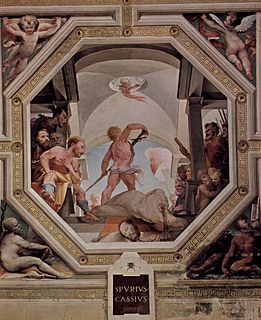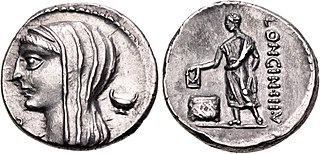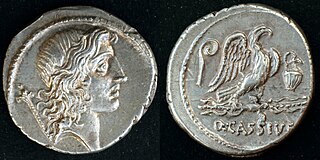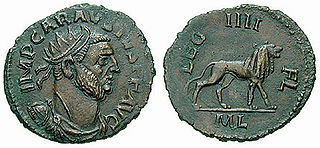Related Research Articles
Pope Zephyrinus was the bishop of Rome from 199 to his death on 20 December 217. He was born in Rome, and succeeded Victor I. Upon his death on 20 December 217, he was succeeded by his principal advisor, Callixtus I. He is known for combatting heresies and defending the divinity of Christ.

Gaius Cassius Longinus, often referred to as simply Cassius, was a Roman senator and general best known as a leading instigator of the plot to assassinate Julius Caesar on March 15, 44 BC. He was the brother-in-law of Brutus, another leader of the conspiracy. He commanded troops with Brutus during the Battle of Philippi against the combined forces of Mark Antony and Octavian, Caesar's former supporters, and committed suicide after being defeated by Mark Antony.

Allectus was a Roman-Britannic usurper-emperor in Britain and northern Gaul from 293 to 296.
Lucius Cassius Dio or Dio Cassius was a Roman statesman and historian of Greek and Roman origin. He published 80 volumes of the history on ancient Rome, beginning with the arrival of Aeneas in Italy. The volumes documented the subsequent founding of Rome, the formation of the Republic, and the creation of the Empire, up until 229 AD. Written in Ancient Greek over 22 years, Dio's work covers approximately 1,000 years of history. Many of his 80 books have survived intact, or as fragments, providing modern scholars with a detailed perspective on Roman history.

Spurius Cassius Viscellinus or Vecellinus was one of the most distinguished men of the early Roman Republic. He was three times consul, and celebrated two triumphs. He was the first magister equitum, and the author of the first agrarian law. The year following his last consulship, he was accused of aiming at regal power, and was put to death by the patricians.

The gens Cassia was a Roman family of great antiquity. The earliest members of this gens appearing in history may have been patrician, but all those appearing in later times were plebeians. The first of the Cassii to obtain the consulship was Spurius Cassius Viscellinus, in 502 BC. He proposed the first agrarian law, for which he was charged with aspiring to make himself king, and put to death by the patrician nobility. The Cassii were amongst the most prominent families of the later Republic, and they frequently held high office, lasting well into imperial times. Among their namesakes are the Via Cassia, the road to Arretium, and the village of Cassianum Hirpinum, originally an estate belonging to one of this family in the country of the Hirpini.
Gaius Avidius Cassius was a Roman general and usurper. He was born in Cyrrhus, and was the son of Gaius Avidius Heliodorus, who served as praefectus or governor of Roman Egypt, and Julia Cassia Alexandra, who was related to a number of royal figures, including her descent from both Augustus and Herod the Great. He began his military career under Antoninus Pius, rising to the status of legatus legionis. He served during the Parthian war of Lucius Verus, in which he distinguished himself, for which he was elevated to the Senate, and later made Imperial legate. During the Bucolic War, he was given the extraordinary title of Rector Orientis, giving him Imperium over all of the eastern provinces of the Roman Empire.
Julius Asclepiodotus was a Roman praetorian prefect who, according to the Historia Augusta, served under the emperors Aurelian, Probus and Diocletian, and was consul in 292. In 296 he assisted the western Caesar Constantius Chlorus in re-establishing Roman rule in Britain, following the illegal rules of Carausius and Allectus.

Quintus Cassius Longinus, the brother or cousin of Cassius, was a governor in Hispania for Caesar.
Asclepiodotus Tacticus, also known as Asclepiodotus, was a Greek writer and philosopher known for his treatise on military tactics.

Cassius Marcellus Clay, nicknamed the "Lion of White Hall," was a Kentucky planter, politician, and emancipationist who worked for the abolition of slavery. He was a founding member of the Republican Party in Kentucky, and was appointed by President Abraham Lincoln as the United States minister to Russia. Clay is credited with gaining Russian support for the Union during the American Civil War.
Polemon Pythodoros, also known as Polemon I or Polemon I of Pontus was the Roman Client King of Cilicia, Pontus, Colchis and the Bosporan Kingdom. Polemon was the son and heir of Zenon and possibly Tryphaena. Zenon and Polemon adorned Laodicea with many dedicated offerings.

The Carausian revolt (AD 286–296) was an episode in Roman history, during which a Roman naval commander, Carausius, declared himself emperor over Britain and northern Gaul. His Gallic territories were retaken by the western Caesar Constantius Chlorus in 293, after which Carausius was assassinated by his subordinate Allectus. Britain was regained by Constantius and his subordinate Asclepiodotus in 296.
Bithynium or Bithynion was a city in the interior of Bithynia, lying above Tius, as Strabo describes it, and possessing the country around Salone or Salon, which was a good feeding country for cattle, and noted for its cheese. It was the capital of Salone district. Bithynium was the birthplace of Antinous, the favourite of Hadrian, as Pausanius tells us, who adds that Bithynium is beyond, by which he probably means east of, the river Sangarius; and he adds that the remotest ancestors of the Bithynians are Arcadians and Mantineis. In this case a Greek colony settled here. Bithynium was afterwards called Claudiopolis, a name which it is conjectured it first had in the time of Tiberius; but it is strange that Pausanias does not mention this name. Dio Cassius speaks of it under the name of Bithynium and Claudiopolis also. It later bore the name Hadriana after the emperor. The names of Claudiopolis and Hadriana appear on coins minted here.

Cassius Clay Dowell was a Republican U.S. Representative from Iowa. He served from 1915 to 1935, and again from 1937 until his death in 1940, with the interregnum caused by an unsuccessful campaign for reelection in 1934.
Asclepiodotus may refer to:
Asclepiodotus of Alexandria was a Neoplatonic philosopher who lived in the second half of the 5th century. He was a native of Alexandria who studied under Proclus in Athens. He eventually moved to Aphrodisias where he maintained a philosophy school jointly with another man also called Asclepiodotus, whose daughter, Damiane, he married. He wrote a commentary on Plato's Timaeus, which is however lost.
Asclepiodotus of Lesbos was an ally of Mithridates VI of Pontus during the First Mithridatic War of 90-85 BC. He was close to Mithridates, and had once entertained him as a guest. In the later stages of the war, c. 85 BC, he joined with three other intimates of the king, Cleisthenes of Lesbos and Mynnio and Philotimus of Smyrna, in a conspiracy against him, but informed him of the plot, advising him to hide under a couch to hear Mynnio incriminate himself. The conspirators were tortured to death.

Nerva ; was Roman emperor from 96 to 98. Nerva became emperor when aged almost 66, after a lifetime of imperial service under Nero and the rulers of the Flavian dynasty. Under Nero, he was a member of the imperial entourage and played a vital part in exposing the Pisonian conspiracy of 65. Later, as a loyalist to the Flavians, he attained consulships in 71 and 90 during the reigns of Vespasian and Domitian, respectively.
Arduba was a settlement of the Illyrian tribe of the Daesitiates in Illyria. Following the Roman invasion, the settlement was included in the Roman province of Dalmatia. Arduba was located somewhere near the modern city of Zenica in Bosnia and Herzegovina. Most probably the royal city of Vranduk existed in the time of the Illyrians, under the name Arduba.
References
- This article incorporates material from the Citizendium article "Cassius Asclepiodotus", which is licensed under the Creative Commons Attribution-ShareAlike 3.0 Unported License but not under the GFDL.